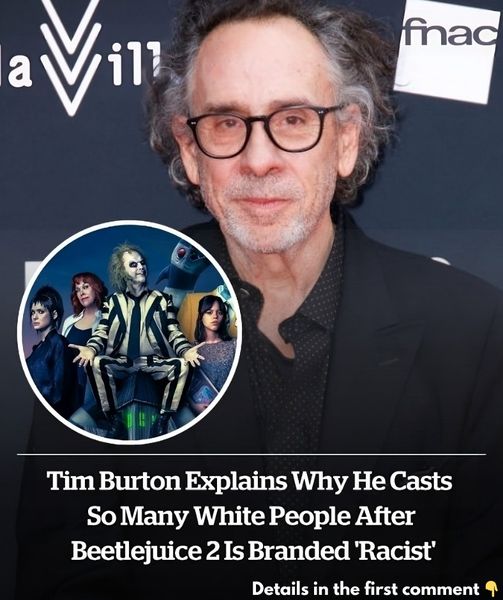Tim Burton, a renowned filmmaker, has found himself at the center of controversy once again, this time for the casting decisions in his highly anticipated sequel, Beetlejuice 2. Despite featuring popular actors like Winona Ryder, Michael Keaton, and Jenna Ortega, the film has faced significant backlash for its lack of diversity, sparking an online debate about racial representation in Hollywood. Critics have labeled the movie “racist” due to the predominance of white actors in the cast and specific scenes that some argue trivialize Black culture. Burton, known for his distinct creative style, has responded to these allegations, defending his artistic choices and providing his perspective on the ongoing conversation about diversity in filmmaking.

The Controversy Surrounding Beetlejuice 2
After its release, Beetlejuice 2 quickly became the subject of scrutiny. Fans of the original film were excited to see the return of beloved characters, but some viewers expressed disappointment at the lack of racial diversity in the sequel, a recurring issue in Burton’s filmography. A particular scene that drew the most attention involved Jenna Ortega’s character, Astrid Deetz, boarding a version of the iconic ‘Soul Train.’ The 1970s television show, celebrated for spotlighting Black culture and artists, became a focal point for critics who found the reference tone-deaf. Social media platforms, including X (formerly Twitter), buzzed with reactions from viewers who were uncomfortable with how the scene portrayed Black culture. One user stated, “The only time Black people are acknowledged in the movie is through a Soul Train joke. It’s unsettling.”
As the conversation gained traction, many questioned why Burton, a filmmaker with significant influence, consistently opts for predominantly white casts in his movies, sparking a broader conversation about his approach to inclusivity on screen.
Tim Burton’s Defense of His Artistic Choices
In response to the backlash, Burton addressed the accusations of racism and explained his perspective on casting. He made it clear that his decisions are rooted in his creative vision rather than a desire to meet external expectations regarding diversity. Echoing sentiments he has expressed in the past, Burton stated, “Some stories naturally call for certain elements, while others don’t. I’ve never been comfortable forcing diversity into a narrative where it doesn’t organically fit.”
Burton’s childhood experiences with media have influenced his outlook on representation. He referenced shows like The Brady Bunch, where, in his view, characters of different races were added simply to check a box rather than contribute meaningfully to the story. “Back then,” he explained, “I saw films like blaxploitation, and I never thought they needed more white characters. The authenticity of the narrative should always come first.”
While Burton’s defense reflects his personal convictions, it hasn’t quelled the criticism from those who believe his films contribute to the broader issue of racial underrepresentation in Hollywood. The debate around Beetlejuice 2 has reignited discussions about the industry’s struggle to balance artistic freedom with a responsibility to reflect the diversity of modern society.
A History of Similar Criticism
This isn’t the first time Burton has faced pushback regarding his casting choices. In 2016, while promoting Miss Peregrine’s Home for Peculiar Children, he was asked about the notable absence of people of color in his films. At that time, Burton expressed a similar viewpoint, saying that he only casts diverse actors when the role specifically demands it. His remarks were met with criticism from those who saw his comments as out of touch with the modern push for inclusion.
Another instance of Burton’s work facing racial scrutiny occurred with The Nightmare Before Christmas. The character Oogie Boogie, voiced by Black actor Ken Page, was seen by some as having racially insensitive undertones. Screenwriter Caroline Thompson revealed her discomfort with the character, noting that “Oogie Boogie” was historically used as a derogatory term for African Americans in the Southern United States. Although she pushed for changes to the character, her efforts were unsuccessful.
The Ongoing Debate: Artistic Vision vs. Social Responsibility
Burton’s defense of his creative choices raises an important question: How should filmmakers balance their artistic vision with the growing call for more inclusive representation? Burton has made it clear that he prioritizes the authenticity of his narratives above societal pressure to diversify his casts. However, critics argue that in a globalized and increasingly diverse industry, major directors have a responsibility to reflect the world as it is today, with all its cultural complexities.
While some believe that Burton’s approach stems from a commitment to his craft, others feel that his reluctance to embrace diversity risks alienating large portions of his audience. In an industry where representation can shape societal perceptions, the lack of inclusivity in Burton’s films remains a point of contention.
Success Despite Controversy
Despite the ongoing criticism, Beetlejuice 2 has performed well at the box office, grossing over $250 million worldwide. The film’s financial success demonstrates that, for many viewers, the nostalgia and excitement of revisiting a beloved franchise outweighed the concerns about racial representation. However, the conversations about diversity in Hollywood persist, and the spotlight remains on Burton’s casting practices as fans and critics alike wonder whether his future projects will reflect more inclusive storytelling.
Can Tim Burton Evolve with the Times?
Tim Burton’s filmography is undeniably iconic, but it exists in a world where the demand for diversity and representation is stronger than ever. While Burton continues to stand by his casting decisions as being true to his creative vision, his refusal to adapt to changing expectations risks isolating a growing segment of his audience. As more filmmakers champion inclusive narratives, it remains to be seen whether Burton will evolve his approach. What’s clear is that audiences are increasingly aware of who gets cast and how they’re portrayed on the big screen.





